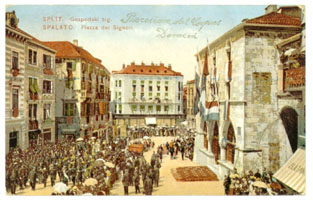 |
SPLIT IN 1893 by Vjeko Omašić |
 |
SPLIT IN 1893 by Vjeko Omašić |
Social circumstances in Split and
Dalmatia during the construction of the Municipal Theatre. Due to the vicinty of the ancient Roman town of Salona, on whose foundations the Christian mediaeval Croatian town of Solin had grown, the first international congress of early Christian archaeologists was held in Split in 1894. |
 By the time the construction of the theatre started, the pro-Italian Autonomist movement had been relegated to a marginal status and was constantly losing in significance, while the number of people regarding Italian as their mother tongue was permanently decreasing. At the same time the antagonism of the remaining autonomists towards the Croatian authorities was growing and gaining in force. The construction of the Municipal Theatre also had to meet with harsh criticism. The leader of the Dalmatian autonomists Antonio Bajamonti put forward a proposal that, instead of building a new theatre, his theatre should be renewed, and that the repertoire performed should be in both languages, i.e. Italian and Croatian. The refusal gave rise to numerous imputations od the part of the autonomists, their main argument being the high cost of the project. All doubts were however dispelled by the opening itself, proving again the significance of the town of Split, especially in view of the fact that a similar theatre was not to be built in Zagreb until two years later. |